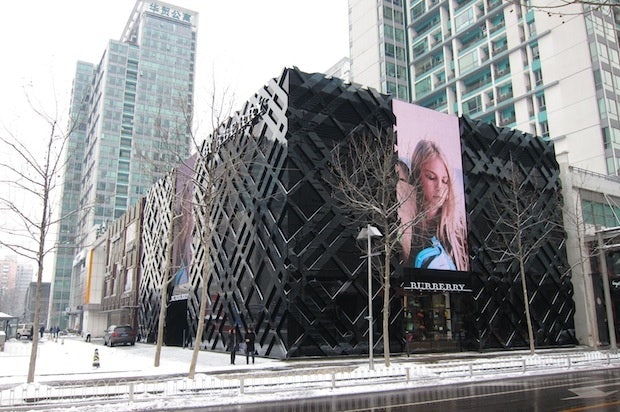First-Quarter Downshift Leaves Luxe Brands Pondering New Strategies#

Burberry's Beijing flagship store, which opened in 2011. (Timothy Coghlan/The Maosuit)
This week's report of China's surprisingly slow first-quarter GDP growth has left luxury giants such as LVMH grappling with dismaying headlines and decreasing stock prices. Compounding the worries, the news came amidst a general months-long slowdown in China's luxury market, sparked by a combination of economic factors and the Chinese government's continued crackdown on luxury goods sales. But one bright spot in the China luxe landscape made news today: Burberry's counterintuitively higher-than-expected second-half revenue numbers.
The recent short-term stock dip affected both LVMH and Burberry, as well as other global luxury companies such as PPR and Richemont, and has been attributed by experts as strongly connected to China's slowdown news. This week’s report revealed that the country experienced 7.7 percent GDP growth this quarter -- a decrease from last quarter that contradicted expert predictions forecasting a higher figure. LVMH's fashion and leather goods division took the biggest hit, sinking by 3.5 percent on Tuesday to a five-month low. But LVMH's decrease isn’t just short term; on Monday, the brand reported its worst quarterly sales growth since 2009.
Burberry, though, became a bright spot for luxury in China, surprising experts with relatively high growth numbers. The company, which experienced plunging stocks in September, today reported a 10 percent rise in fourth quarter revenue. News reports attribute the growth primarily to the brand’s large and growing China market.
China’s luxury growth has been nudged downward by both the economy and the government's crackdown on luxury spending and gifting, with some companies more clearly affected by one or the other. In an interview with Reuters, LVMH chief financial officer Jean-Jacques Guiony attributed LVMH's sluggishness to both factors, stating that China's "economic growth is not what is used to be ... And the change in leadership has had some consequences in terms of gifting.” Meanwhile, plunging sales of luxury baijiu, a common "gift" for officials and staple at now-banned luxury banquets, are clearly attributable to the crackdown.
Burberry's success has shown that it is not impossible for luxury companies to prevail amidst the slowdown. In fact, LVMH's wine and spirits division has also actually fared better than its clothing and leather goods, thanks to rising demand in China for Hennessy Cognac among younger drinkers.
To deal with the overall decrease in sales, luxury sectors have taken a variety of approaches. Some high-end fashion retailers have braked their expansion plans and switched to a focus on high-end consumers; others have considered lowering their prices. LVMH has been following the measured-growth approach, favoring a freeze on Louis Vuitton's global expansion and developing more upmarket products.
Louis Vuitton has also joined many brands in adopting a strategy of downplaying logo-heavy fashions and accessories in favor of subtler, less ostentatious displays of wealth. The label recently launched an advertising campaign in China featuring a bag on which its ubiquitous, world-renowned logo was conspicuously absent.
In other fields, price decreases may accompany decreased demand. According to a recent Financial Times report, upscale service industries such as catering and floral designers, which thrived on the roaring banquet culture, may need to downshift their market and lower their prices to attract more middle-class consumers. Even an LVMH spokesperson noted that the company's prices have dropped in response to demand in China that has been "flattish" over the past 10 months.
Despite slowdown concerns, China remains on track to surpass the United States as the world's leading source of luxury consumers in the coming years. A report in yesterday's Financial Times put the recent GDP numbers in perspective, stating: "After all, 7.7 percent growth is still fast, especially compared with the vast majority of G20 economies."
